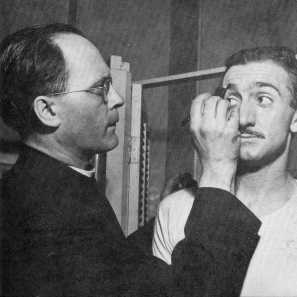Canadian Theatre Encyclopedia
Compagnons de Saint-Laurent

Theatre company founded by Père (Father) Émile Legault and Francois Lavigne in 1937, source of many of the country's great actors and directors.
According to Father Legault's memories of the time, the era was artistically vital, with music, painting and literature flourishing. He saw a hole for theatre and set out to fill it. "I had the taste," he wrote, "to once again haunt the great spaces of a stage. But mostly I fell prey to the irresistible passion for the invigoration the theatre provides; its repertory, its style of acting, its design, the primacy of poetry. In a Christian climate."
Here, in a nutshell, we have the guiding philosophy of the Compagnons. It wasn't long before some of the soon-to-be-great actors of the country were haunting that stage with Father Émile - Pierre Dagenais, Jean-Louis Roux, Jean Gascon, Georges Groulx, Guy Provost, Denise Pelletier and her brother Gilles, Hélène Loiselle, François Faucher, Jean Duceppe, Denise Morelle, Francois Lavigne - in an mixture of Molière, passion plays, Shakespeare, and the moderns too, Lorca, Giraudoux and Thornton Wilder among them.
Despite little funding and a thoroughly bizarre series of plays, the company had no shortage of admirers who felt something quite special was happening in Montreal. Critics from across Canada and Europe, French-speaking and English, began to talk about this energetic priest and his acolytes. The group began by performing in a hall in the Côte-des-Neiges district, then at the Salle du Gésu and finally, when they turned professional in 1948, in an Anglican church in Montreal's East End.
As these things go, the end of Les Compagnons was typical and inescapable. The bigger and less rough the company became, the more noticed and admired became its actors. Many went on to study and perform in France and Britain and to return to Canada stars and leaders of the business (a small cadre of them founded the Théâtre du Nouveau Monde and hired many of the same actors). Even as Father Legault was starting to get a grip on the art and create a core ensemble they were leaving. By 1952, the good Father saw the writing on the wall (and in the reviews) and brought a conclusion to this important period in Canadian theatre history.
Jean Louis-Roux wrote of the experience: "It is to [the Compagnons] that many of us owe what we are today; it was they who guided our first steps in our careers. We gave to the Compagnons the best of the best years of our youth."
A park in Montreal's Le Plateau district is named in the company's honour.
Profile by Gaetan Charlebois
Last updated 2019-02-25

